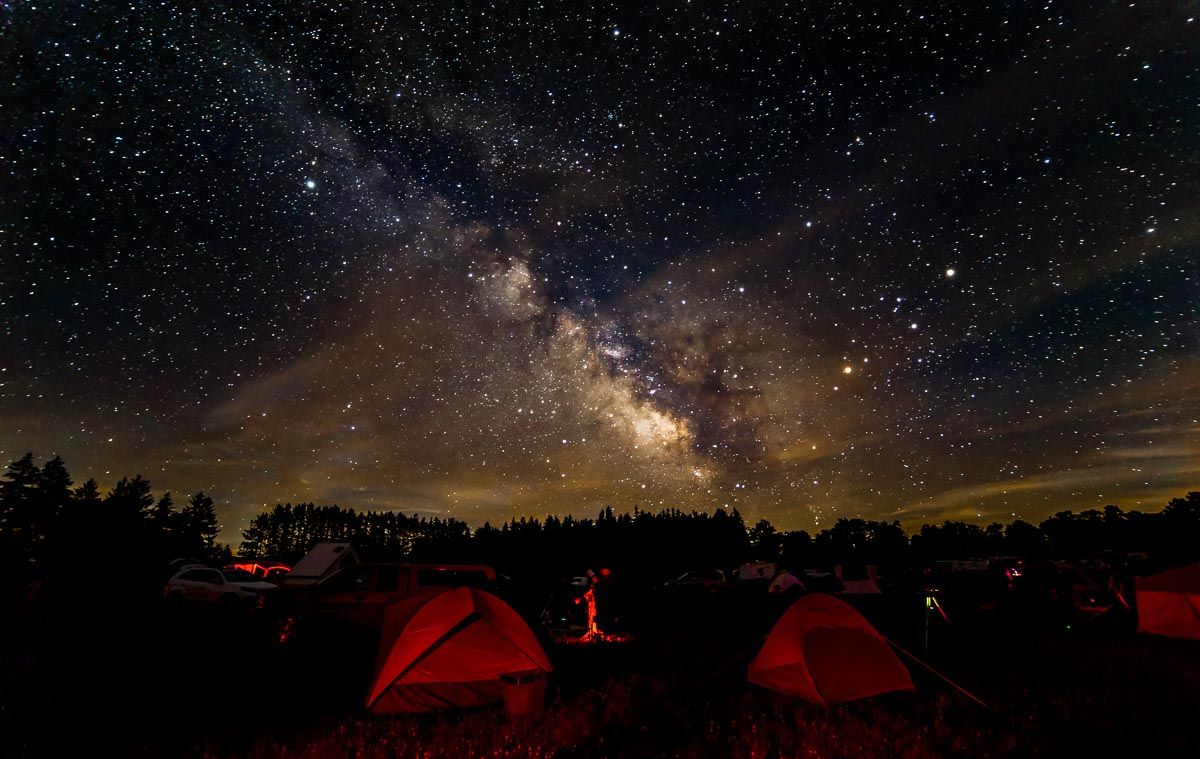Camp Local 1: Shine Like Stars

Sermon Delivered at The Local Church
July 10, 2022
Scripture: John 3:16; Genesis 15:1–6; Philippians 2:12–16
Over in Durham, a new mural has gone up near the Brightleaf Square district. It was painted by artist and friend of The Local Church, Loren Pease. It features a quotation by Kate Bowler — div school professor, podcaster, author — and it’s probably one of the most resonant quotations from her incredible first book, Everything Happens for a Reason: And Other Lies I’ve Loved. So they picked a good one. Here’s the mural:
Life is so beautiful. Life is so hard.
I love this. It’s such a human statement. It contains the complexities of what it means to live and move in the world. It holds in tension two realities that we know deep in our bones.
We can experience injustice and also sing happy birthday and eat cake. We can cultivate meaningful friendships and feel deep sadness when they leave. Our hearts can ache from a loved one’s diagnosis and our sides can hurt from laughing until we cry. We contain multitudes.

Life is so beautiful. Life is so hard.
Lately, though, at least for me — and I’m pretty sure I’m not alone — it’s felt like there’s been more hard than beautiful.
A mass shooting in Uvalde a few weeks ago and still another on Monday in the suburbs of Chicago.
A war that continues to rage in Ukraine.
Rising gas prices and food costs coupled with wages that don’t follow suit.
Bare shelves where infant formula had once been stocked.
The tragic death of students here in our community.
A fear and helplessness that is palpable in the wake of legal decisions that have rocked so many of us.
And that’s on top of the hard and heavy we experience each day — whether it’s our kids going through a crisis, or the breakup we didn’t see coming, the work you can’t seem to catch up on, or the sale that didn’t come through, or the grief that’s kicked up when we least expect it, the illness that knocks us off our feet, or the inexplicable loss of someone dear to us.
It’s so much.
And even though there have still been beautiful moments — births and weddings and baptisms, play dates and beach vacations, quiet moments with a glass of wine — or maybe for you, it’s tea or something else… Even though there have been some beautiful moments, it often feels like the hard’s crowding it out, you know? Quick to steal our joy and kill our vibe.
And I don’t know what you do in these moments. Sometimes for me, my shoulders slouch and my head lifts to the sky, and I just let out a guttural, “UGH.” I think Abe Simpson is right.
Old Man Yells at Cloud.

I feel this energy deeply. Anybody else?
And frankly, I think he has the right idea. The sky is perhaps exactly where we should be looking. To find that beauty. And to realize that we’re not alone. More on that in a bit.
I read an essay earlier this week in the New York Times about the state of our world, particularly in the U.S., and the author, Tim Kreider had this to say:
Of course, everyone is still busy — worse than busy, exhausted, too wiped at the end of the day to do more than stress-eat, binge-watch, and doomscroll — but no one’s calling it anything other than what it is anymore: an endless, frantic hamster wheel for survival.
We can do better. We’re called to more. More than shouting angrily at the clouds. More than doom scrolling. We can do better than merely surviving. God wants more for us.
And this is precisely what the next few weeks are going to be about here at The Local Church: Looking up. Reclaiming wonder. Experiencing Sabbath and renewal and community and beauty in a way that doesn’t downplay or diminish the hard. We’re not here for that. Not trying to pretend it doesn’t exist and move on to happier things. But we do want to put the hard in its place — and along the way, experience together the beauty of life and one another and creation. The chance to take a collective deep breath and reconnect with God, with each other, and with ourselves. The chance to remember who and whose we are.
Sometimes to do this, you have to get away from it all, don’t you? You need some distance to find some perspective. Jesus knows this, too. This is what he’s getting when he says in Matthew’s Gospel (and this is Eugene Peterson’s translation):
Are you tired? Worn out? Burned out on religion? Come to me. Get away with me and you’ll recover your life. I’ll show you how to take a real rest. Walk with me and work with me—watch how I do it. Learn the unforced rhythms of grace. I won’t lay anything heavy or ill-fitting on you. Keep company with me and you’ll learn to live freely and lightly.
How good does that sound?
So this morning, we want to invite you to get away with Jesus. Some distance for some perspective. But you’re not going alone. We’re coming, too. For the next few weeks here at The Local Church, we’re heading to summer camp — and we’re going to find beauty, wonder, renewal, and reconnection. It’s a sermon series that’s actually so much more than a sermon series. Just you wait. So friends, welcome to Camp Local. Let’s have some fun.
This morning, as we gather here around the campfire for our first Sunday of Camp Local, we begin our time just like Abe Simpson and just like millions of people have before us — looking up. Each week, we’re going to center our camp around a different theme. And this week, to kick things off, we’re lifting our gaze to the heavens because it’s Cosmos Week.

Bethany read for us John 3:16 — one of the most famous verses in the whole Bible. “For God so loved the world that he gave his only Son, so that everyone who believes in him may not perish but may have eternal life.”
For God so loved the world…
But, fun fact, the Greek there is actually cosmos. So what John, the Gospel writer, is implying here is that God’s love is for all that is. Everything that God has ordered. And so, for us, we can say that God’s love is not just for the Earth. It is, but there’s more. It’s for the whole cosmos. The whole universe. It’s a love that’s so big that it’s hard to fathom. Every plant and planet. Every moon and molecule. God’s love stretches from the tiniest atom to the largest star. It’s that expansive. That’s what we’re leaning into this morning. The expanse of the cosmos.
Maybe you’ve felt that expanse when you’ve looked up at the night sky. I want you to close your eyes and imagine what you see when you walk outside in the middle of the night and look up at the sky. Now imagine what it would look like absent street lights and headlights and lights from buildings or the lights creeping in from the nearest urban location. It would probably look something like this. This is a picture from Cherry Springs State Park in Pennsylvania, one of the best places to stargaze because it’s one of the darkest places in the U.S.

This is probably what someone like Abram would’ve seen in the ancient desert in which he found himself — before light pollution was a thing. The vast expanse of stars. The Milky Way dazzling above. Abram, who would become Abraham, is the patriarch of the Jewish people.
It’s Abram who, at 75-years-young, had been sent by God to pack up and pick up and leave his home with his wife, Sarai, for a new place where God would settle him. We read this story in Genesis, the very first book of the Bible in the Old Testament — the story of God and God’s people before Jesus. And it’s in this new land where God is going to form a people — a nation — who would enjoy a special relationship with God and show the world what it means to live right and well and faithfully — “blessed to be a blessing,” God says. Abram is going to be the father of these people. And to this point in the story, God has made these promises. Abram has picked up and left at God’s leading. He’s settled in the land of Canaan. Right before what Bethany read, Abram had been engaged in a battle to rescue his nephew, Lot — which is why the first verse must’ve been particularly comforting.
God shows up in a vision to Abram and says, “Do not be afraid, Abram, I am your shield; your reward shall be very great.”
And Abram essentially responds, “That’s great, but about this reward — are we talking about my offspring you promised me or what? I’m not getting any younger. Sarai isn’t either. What about the descendants you promised me?” In other words, Abram is pushing back, saying, “A reward? Really?”
We’re not sure whether it’s curiosity or disbelief or skepticism, but notice how bold Abram is in his questioning of God. Don’t miss that.
It feels, to me, like disappointment. We can sense Abram trying so hard to cling to the promises that God had made, in particular one of offspring, descendants — promises of how things are supposed to be — and still feeling like they’re a long way off. Wondering if they’ll ever come to pass.
Y’all, I feel this. Maybe you have, too. Chances are good you know something about disappointment. Maybe you’ve been passed over for a job or a date. Maybe you didn’t get into your first-choice school. Maybe you’ve had to give up a dream. Maybe where you are now isn’t where you thought you’d be, and you’re wondering how it went down.
Or maybe you’re looking around at the world — at the cosmos — and feeling the disappointment of who we’re becoming. Of the sort of world your kids are growing up in. The mess we’ve found ourselves in.
And then you show up here on Sunday mornings for some good news, and you, too, are just like, “Really?”
But notice what God does next. God essentially tells Abram to look up. Here’s verse 5:
He brought him outside and said, “Look toward heaven and count the stars, if you are able to count them.” Then he said to him, “So shall your descendants be.”
God tells Abram to look up. To lift his gaze toward the sky full of stars. And God says, “Count them. So shall your descendants be.”
A common misconception is that God is talking about sheer numbers here. But that’s not the full picture. The Hebrew word that’s translated here for “count” can also be translated “take account of” or “interpret” or “explain.” And the point here is that if we’re talking only about sheer numbers, we’re missing the big picture. Literally. It’s not necessarily the quantity that God wants Abram to focus on but the quality of the stars. Not just on how numerous they are but how luminous they are. About the story they’re telling. The ways they shine. Their brightness. Their glory.
And what’s more, to take account of the stars and the story they tell is to remember who God is and what God’s relationship to Abram and the rest of the cosmos is — that of the creator who orders all things in the heavens. Who holds up the night sky and causes these stars to shine. Whose love is as expansive as the night sky. In other words, God is calling Abram to faith, trusting that the same God who holds up the stars in the night sky is the same God who holds him now — even in his disappointment, even in his incredulity, even in his heartache.
As he looks to the night sky and feels his feet digging into the dirt, he remembers his place in God’s ordered creation. He realizes anew that he’s caught in something bigger than himself. He trusts anew that, even in tumult and chaos, even when it seems so distant, God will make good on God’s promises.
And perhaps, as he gazes toward the heavens, he stands there remembering that he’s not the first to look up and take in the grandeur of the night sky. And he won’t be the last either. Perhaps there’s a reminder there that Abram is not alone.
He couldn’t have known it, but there’s another who would come who no doubt also looked up at the night sky — one of Abram’s long-promised descendants — a Jew from Nazareth who arrived at the leading of a star and whose own star would refuse to die — a star whose light would shine so brightly that the darkness couldn’t overcome it.
This light brought healing to the brokenhearted, refuge for the marginalized, justice for the poor, and hope for the downtrodden. And it’s a light that burned in the hearts of others like the Apostle Paul who, in his letter to the church in Philippi, calls these followers of Jesus, these early carriers of the light — to work out their salvation with fear and trembling. (We might call it awe and wonder.) And in the midst of a world that feels like it’s lost its mind, Paul tells them to obey Christ and, in so doing, they’ll… shine like stars.
When God tells Abram to look to the night sky and count the stars, in the way that only God can, God is talking about Jesus, and God is talking about you. Abram couldn’t see the fulfillment of God’s promises at the time; all he could do was believe — but the evidence is right in front of you and right in front of me that God keeps God’s promises.
On a clear night, when you look up at the stars, because of the finite speed of light, you are actually looking into the past. Perhaps this is an invitation to remember Abram, whose faith sustained him even when it was hard to believe and cling to God’s promise. Maybe it’s an invitation to remember Jesus, whose light was so bright that the darkness couldn’t overcome it. Or Paul who invites us still with our hands, feet, heart, and voice — with our whole lives — to shine like the stars we see. And maybe as you wonder anew, staring up at the cosmos, you’ll remember your place in something bigger and, however briefly, rest in the love of a God whose love is as big and as beautiful as the night sky.
In the name of the God of the Universe, Creator, Redeemer, and Sustainer: Amen.
